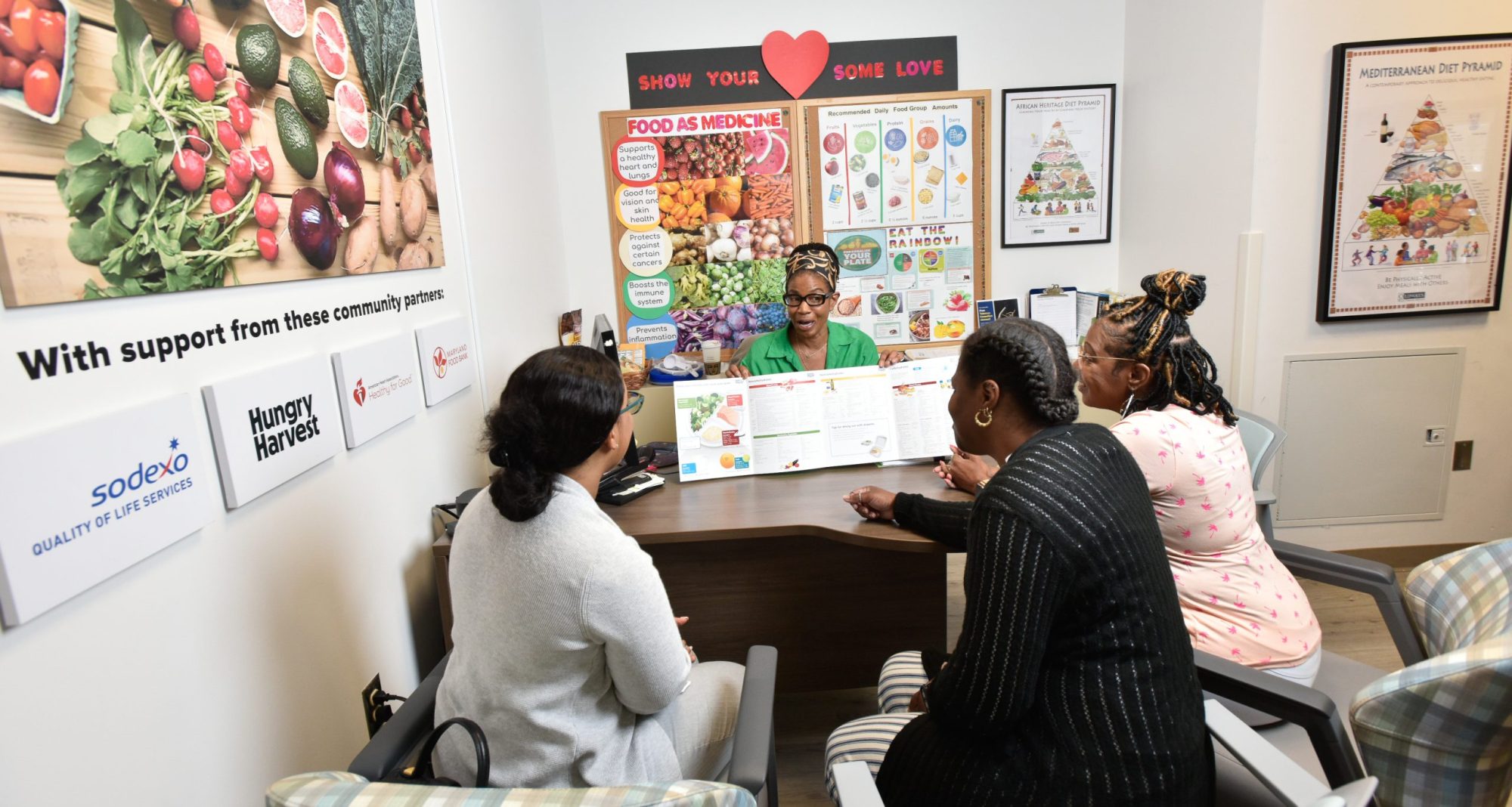By: Eric Addison
Angela Roberson, ’19, owned and operated a health and fitness business for 15 years before she decided to pursue a degree in Nutritional Sciences at Morgan State University. Many of her gym’s clients had begun asking her for dietary advice to address health problems such as obesity and diabetes, and she wanted more knowledge to be able to help them. Her Morgan education gave her that, as well as a new career path.
“Once I got back into real science classes, I realized that I really like it, and I’m interested in it, not just on that sort of surface, ‘eat more vegetables, get more sleep’ level, but on the more biological, physiological level,” Roberson says. “As I started to see how nutrition has such a critical impact on overall health, once I started learning the clinical part of nutrition, I knew that’s where I wanted to stay.”
Roberson graduated from Morgan in 2019 and is a registered dietitian and licensed dietitian-nutritionist (RD, LDN) now, with the Collaborative Care Program at MedStar Good Samaritan Hospital in her hometown, Baltimore City, not far from Morgan’s campus — an occupation that enables her to continue fulfilling her lifelong desire to fellowship with people and assist.
Baltimorean Jessica Lawson Goldberg likewise turned to Morgan’s Nutritional Sciences Program for knowledge and skills to help people in her city. During her six-year career interacting with clients as a rental property manager, she had seen more housing insecurity and food insecurity than she could reconcile with her belief that “everybody deserves safe housing and nutritious food that’s affordable and accessible,” she says. “I wasn’t sure how I could help, but I knew that getting a degree in nutrition would be the best place to start.”
Lawson graduated from Morgan in 2020, earned her RD and LDN credentials and now works for Johns Hopkins Community Physicians as a diabetes educator at a medical center in Baltimore City, providing uninsured as well as insured patients of all ages with nutrition and medication counseling as well as referrals to other health care providers within the center.
But a main goal of Morgan’s Nutritional Sciences Program is outreach to address the deficient state of nutritional wellness in Baltimore City, where more than 23% of residents and 34% of resident children under age 18 live in poverty and 35% of residents live in food deserts.
Urban Focus
The Bachelor of Science in Nutritional Sciences Program at Morgan offers education to prepare students for careers as registered dietitians/nutritionists (RDs or RDNs) in varied settings such as hospitals, long-term care facilities, public health clinics, K–12 schools, universities, the food industry, government agencies, research laboratories and private practices.
But a main goal of the program is outreach to address the deficient state of nutritional wellness in Baltimore City, where more than 23% of residents and 34% of resident children under age 18 live in poverty and 35% of residents live in “food deserts,” communities without convenient access to healthy, nutritious foods, says the program’s director, Joycelyn Peterson, Dr.P.H., RDN. Being effective in that work means addressing another problem, Dr. Peterson adds: the lack of diversity among registered dietitians/nutritionists nationwide. Only about 3% of credentialed workers in the field are people of color. “We want to focus on reducing the disparity in healthcare,” she says. “We want to have more professional people of color in this area.”
“Community outreach efforts are my area of expertise in the fields of nutrition and public health,” Dr. Peterson says. “After coming on board at Morgan State University, I began to survey the community within a one-mile radius of the school and found that there were unmet needs.”
Early initiatives she led included a community health fair for residents of a housing development near the campus. Virtual outreach with diabetes, food preparation and heart health classes followed, during the COVID-19 pandemic, and in-person cooking demonstrations in the community by Nutritional Sciences students and staff are ongoing.
Among the courses in the Nutritional Sciences Program’s recently revamped curriculum is Community Nutrition, which examines the cultural, ethnic and socioeconomic factors that underlie food selection, methods of preparation and potential nutrient value, and gives students opportunities to evaluate community programs addressing nutrition and health. Nutritional Sciences student Barbara Reyes visited a food pantry in downtown Baltimore as part of the Community Nutrition course, which also gave her another assignment that dovetailed nicely with her current employment with the federal government’s Special Supplemental Nutrition Program for Women, Infants and Children (WIC).
“I had to complete a community needs assessment project based on a specific group of people. My target group was refugee families at WIC,” recalls Reyes, who is a native of New York City. “I was already a WIC employee when I started this class, so I enjoyed the class very much because of that…. Learning about how the food pantry works and how it was impacted after the pandemic was very interesting to learn about. Sharing my knowledge with classmates regarding what I do at WIC was also nice to do.”
Using what she learned in Community Nutrition later in her career is a definite, Reyes adds: “I want to continue working at WIC as a soon-to-be RD and pursue my career in a hospital setting later on.”
We want to focus on reducing the disparity in healthcare. We want to have more professional people of color in this area.
–Dr. Joycelyn Peterson, Director of Morgan’s Nutritional Sciences Program
Visible Growth
Morgan’s Nutritional Sciences Program and the fields of nutritional science have seen tremendous growth since she began her work with Morgan 20 years ago and joined the faculty in 2018, Peterson says. And the expansion is continuing.
Across Hillen Road from the Morgan Business Center, where Nutritional Sciences is now housed, a new, state-of-the-art home for the program is rising. The top floor of Morgan’s new health and human services building, slated to open in Fall 2024, is the program’s next destination. Nutritional Sciences will have a research laboratory there and a greenhouse with space set aside for experimental gardening, among other amenities.
At a “Lunch Power Series” event hosted by the program in March, National Nutrition Month, Peterson outlined plans for purchase of a specially outfitted bus to transport Morgan Nutritional Sciences graduate interns to food desert communities in Baltimore, to deliver produce from Morgan’s new greenhouse and from local farmers, along with dietary advice. Ambitious plans are also afoot for community-facing events using the program’s kitchen, which can serve as many as 500 persons and will remain in the Morgan Business Center. Another exciting project, acquisition of 20 to 30 acres of land for gardening in Harford County, Maryland, is in the negotiation stage with the landowners.
Morgan recently applied for placement approval for 20 graduates of MSU and other schools across the country in highly sought-after internship positions each year, beginning this fall, Dr. Peterson reports. Completion of a 10-month internship in the field is mandatory for college graduates who are seeking the RD or equivalent RDN (registered dietitian/nutritionist) certification by taking the Registration Exam for Dietitians.

Making a Difference
Angela Roberson and Jessica Lawson Goldberg are two of the 15 to 20 graduates produced by the Nutritional Sciences Program annually, many of them destined to become RDs/RDNs who benefit Baltimore City.
“Diabetes wasn’t something that I, particularly, knew a lot about before I started undergrad,” Lawson says, “and I’m finding that there’s a lot of misinformation in communities. A lot of patients come to me and have some thoughts on diabetes that aren’t quite right…. I’m able to kind of guide them in the right direction and educate them. I have some patients that have had great progress and then went home and told their grandchildren who also have diabetes about it and are encouraging other family members to get active and eat healthy.”
Her Morgan education often helps her bond with her patients, Lawson adds: “I am always extremely happy when people recognize my Morgan diploma. I definitely love to connect with alumni and other people who are connected to Morgan.”
Roberson spends her days collaborating with a community health advocate, a physician assistant and a hospitalist in her work as lead dietitian for the Food Rx program at Good Samaritan. Each patient is screened for social needs, including food security, housing, transportation and mental health. Through the six-month program, she provides disease-specific nutrition counseling and education, along with enough food for 10 healthy meals a week for the patient and his/her household. The medically tailored meals go to patients with diabetes, heart failure, cardiovascular disease and other chronic ailments.
She, too, feels she’s making a difference.
“When I can get someone off insulin who goes to the emergency room because their blood sugars are uncontrolled, and they follow-up here on a referral from the hospital, and I can send fresh produce to their house, and I can teach them how to eat to heal themselves, and three months, four months later, they’re managing their diabetes with just food and physical activity, no longer on insulin, they’re getting their lives back, it’s very rewarding,” Roberson says.
“I love my Morgan,” Roberson adds, “and…I really want more diverse representation in this profession. Patients need people who look like them to talk about their diets. I’m rooting for Morgan to make this happen.”





